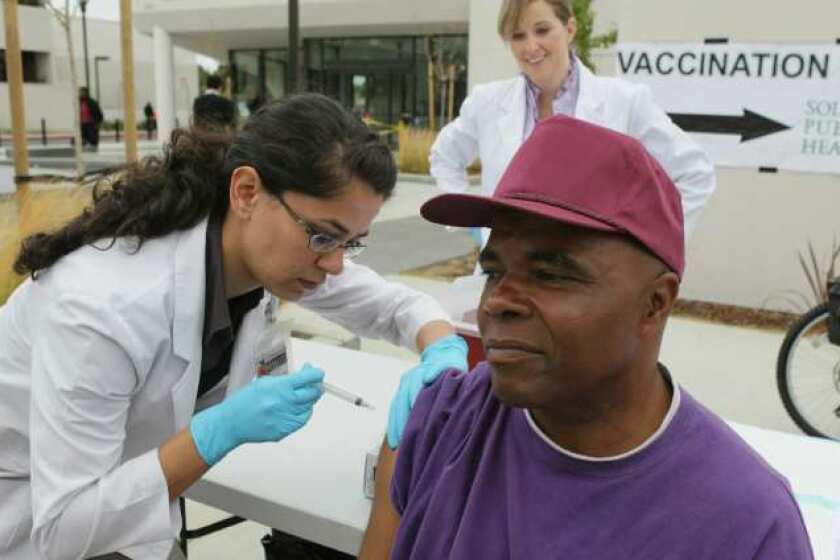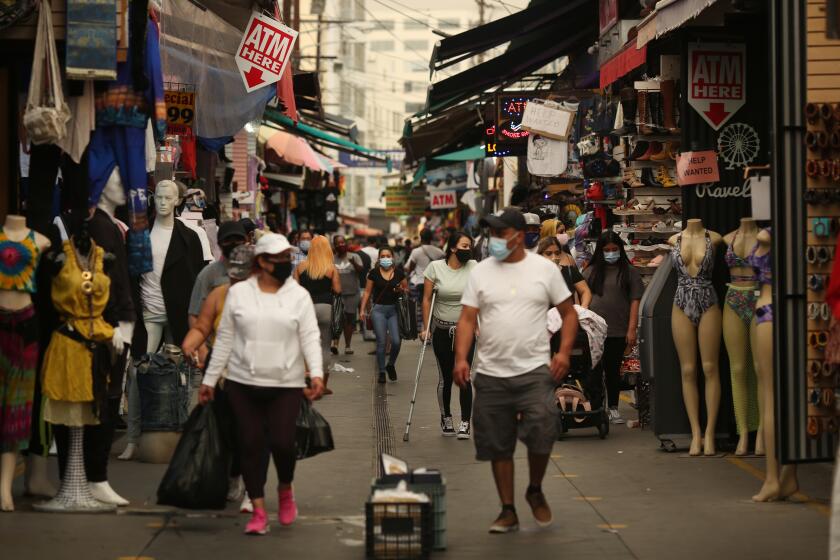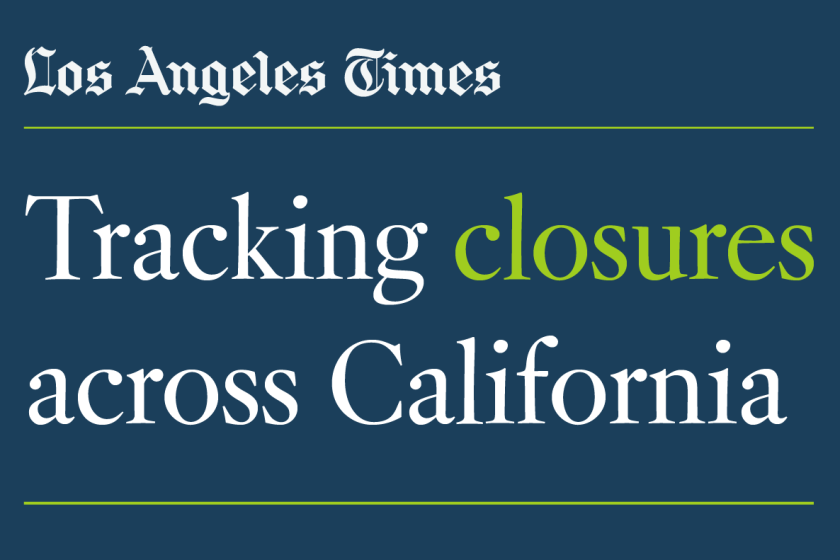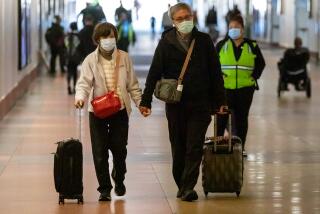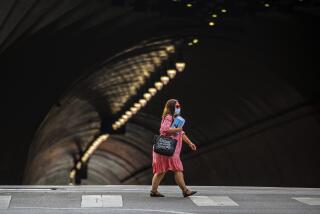California COVID-19 hospitalizations could jump 89% in next month amid signs of coronavirus spread
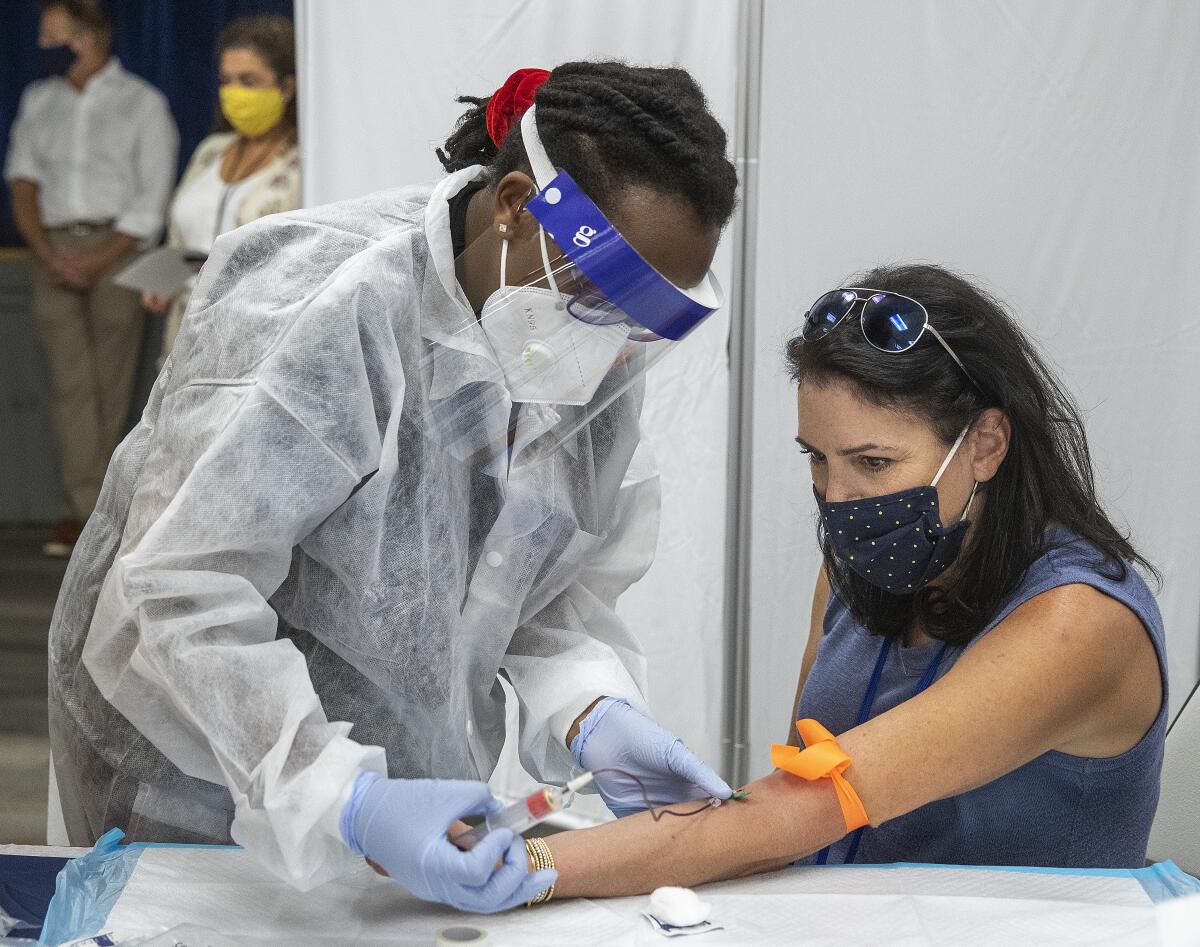
California is expected to see an 89% increase in COVID-19 hospitalizations over the next month amid growing signs that the spread of the coronavirus may be intensifying again, state officials announced Friday.
The proportion of Californians testing positive for the virus continues to remain low at 3% over the last two weeks, and the total number of COVID-19 patients in the state’s hospitals continues to decline, said Dr. Mark Ghaly, the state’s health and human services secretary.
But he said that some other metrics are prompting concern that a feared uptick in the virus’ spread, which public health officials said was possible in the wake of the Labor Day holiday and more businesses reopening, may be materializing.
Many regions have seen a slight increase in the rate of cases per 100,000 residents, and COVID-19-related emergency room visits have trended upward over the last week in virtually all areas of the state, Ghaly said.
The number of new hospital admissions has also crept upwards, “and that means that overall, we’re seeing more admissions than we did the day or week prior for COVID-19 in some of our hospital systems across the state,” he said.
Based on the current conditions, he said, the state is now forecasting that 4,864 people will be hospitalized with COVID-19 by Oct. 25, an increase of roughly 89% from Wednesday, when there were 2,578 patients.
California’s hospitals can handle the patient volume — at its peak in July, more than 7,100 people were hospitalized due to COVID-19. But October marks the start of the flu season, adding an additional layer of concern, Ghaly said.
“We’ve never done COVID hospitalizations with flu hospitalizations, and ... we see things coming together that we want to make sure we’re very vigilant around, to ensure that even if we go up a little bit with our hospitalizations, we don’t continue to have high rates and even come close to the numbers that we saw over the summer,” he said.
He urged people to wear face coverings, avoid gathering with people from outside their households and get flu shots.
“Today’s message is hopeful that all of you as reporters will help us communicate that indeed there is concern and we have the tools to reduce transmission,” Ghaly said, “and by doing these simple things we can hopefully bring these early trends of increase back down and help us get back to where we were just a week or two ago.”
The forecast comes as coronavirus cases in California topped 800,000 on Friday, according to The Times’ tracker, another milestone in a state that is leading the nation in infections.
Yes, it’s that time of year again. Here’s how and where to get a flu shot in Los Angeles and around California, including free options.
Still, America’s most populous state ranks much lower after adjusting for population. Home to 12% of the country’s population, thus far California has accounted for roughly 11% of the country’s coronavirus cases, according to The Times’ tracker.
California topped 15,000 COVID-19 deaths earlier this week, a toll comparable with that of Texas, which was reporting 15,267 fatalities as of Wednesday. But that number remains far below that of New York, which has recorded more than 33,000 deaths. New Jersey has reported more than 16,000 coronavirus-related deaths. Florida on Friday surpassed 14,000 deaths, reaching 14,083.
Earlier this week, the state announced that nail salons across California could reopen. Ghaly said Tuesday that state officials have worked with business sector leaders and county officials to ensure that nail salons can operate indoors in low-risk environments. In some parts of the state, salons have been operating outdoors.
It is ultimately up to individual counties to allow businesses and other sectors to reopen after being given the green light by the state.
Los Angeles County, for example, has refrained from allowing operations to resume at indoor malls, despite having the state’s permission to do so. County health officials have said that such changes will not come until late September, at the earliest, after data that would show whether there has been a Labor Day infection surge and the effects of the state’s new reopenings are assessed.
L.A. County can only enter a new tier on the state’s color-coded reopening blueprint if the positivity rate and number of COVID-19 cases remain low.
But overall, the decline in cases has allowed more sectors of California to slowly reopen.
L.A. Mayor Eric Garcetti said the next few weeks will be crucial if the city wants to see more reopenings.
Los Angeles County is in Tier 1, which means schools and many businesses are closed. To progress through the tier system, a county must meet certain thresholds for two consecutive weeks.
The mayor urged Angelenos to try to keep numbers low so the county can move into the new tier in early October.
In recent weeks, L.A. County officials have reported a decline in the number of COVID-19 infections, hospitalizations and deaths. The county’s daily case count is seven cases per 100,000 residents, and the seven-day average positivity rate is 3% — a notable drop from a reported 8% in July.
To contain the spread of COVID-19, parks, restaurants and stores are slowly reopening.
But over the last week, the number of cases has increased slightly, and the projected transmission rate has crept past 1% to 1.02%. It’s possible those numbers are early indicators that there will be a spike in infections related to Labor Day weekend activity, but officials are not sure yet.
And as the state numbers continue to climb, there are still concerns California could be reopening too quickly.
Santa Clara County’s health officer, Dr. Sara Cody, told supervisors this week that care is still needed.
“Remember, we’re still at significant amounts of COVID spread, and we don’t want to make the mistake that we collectively made earlier where we went a little bit too fast — and then spent the summer with quite a bit of COVID transmission,” Cody said.
Times staff writer Dakota Smith contributed to this report.
More to Read
Sign up for Essential California
The most important California stories and recommendations in your inbox every morning.
You may occasionally receive promotional content from the Los Angeles Times.
